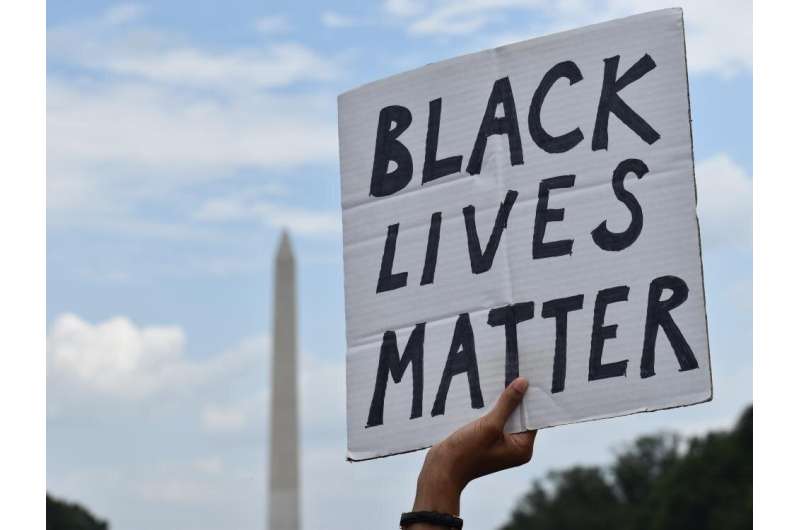
Since its inception in 2013, the Black Lives Matter movement has helped raise awareness and mobilize efforts against racial inequality. It also has spurred controversy, and new research found that experiencing backlash to the movement may have negative health consequences for Black Americans.
The research team, including a professor from Penn State’s College of Agricultural Sciences, found that Black people who lived in areas where anti-Black Lives Matter sentiments were more common online were more likely to have a higher body mass index (BMI) or obesity. This was true even after controlling for such factors as local police brutality rates, individual and regional factors related to health outcomes, and baseline BMIs, said the researchers.
Hyun Joon Park, a recent Penn State graduate student in psychology and now an assistant professor of psychology at Connecticut College, said the findings suggest that being exposed to negative sentiments toward race-related issues doesn’t affect just mental health but physical health, as well.
Guangqing Chi, professor of rural sociology, demography, and public health sciences, said the work—published in the journal Social Science & Medicine—is also a good example of how land-grant universities can help tackle societal problems through their outreach missions.
“Penn State has many world-leading social scientists who have been studying inequity and seek equitable solutions,” Chi said. “This study is one example in which our social scientists use innovative data and advanced methods to study a long-lasting but pressing social problem.”
“Policymakers could consider legislation to help foster safer and more positive social environments for minorities,” Park said. “Additionally, because hostile social sentiments on race-related issues can spread so easily online, social media companies could expand their algorithms to better identify hateful conversations.”
According to the researchers, Black Lives Matter originated in 2013 as a social movement against systemic injustice and police violence toward Black people. But while it quickly gained momentum with its supporters, it also inspired countermovements such as All Lives Matter, White Lives Matter and Blue Lives Matter.
Park explained that he and the other researchers wanted to explore how the prevalence of anti-Black Lives Matter sentiments might be associated with health-related risk factors.
“Specifically, we aimed to investigate whether living in regions where higher in anti-Black Lives Matter sentiments were expressed online was associated with higher BMI and obesity,” Park said. “It is essential to identify how race-related stressors may lead to obesity, as obesity is often a gateway to other diseases.”
For the study, the researchers analyzed more than 50,000 tweets posted between 2014 and 2016, using machine learning to determine whether or not the tweets were negative toward the Black Lives Matter movement. They included only geo-coded tweets—those that included data about where the person who sent the tweet was located.
The researchers then pulled data on more than 20,000 Black Americans’ BMI and obesity state from the Centers for Disease Control’s Behavioral Risk Factor Surveillance System survey in 2017.
Finally, they retrieved data on explicit and implicit racism from Project Implicit, a database tracking incidents of racism reported by millions of people. From these data, the researchers identified 934,910 expressions of explicit racism and 885,808 of implicit racism. They also pulled data on local police brutality rates from previous research.
After analyzing the data, the researchers found that for every 7.5% rise in negative stances toward Black Lives Matter, there was a 0.20 point rise in BMI and a 6% increase in the likelihood of being obese for Black people living in that area.
The results also suggested that stances against Black Lives Matter were associated with higher levels of local implicit racism, but not explicit racism, against Black people. Chi said one surprising finding was that negative stances on Black Lives Matter were also associated with lower regional rates of police brutality toward Black people.
“It’s possible that people living in regions with higher police violence rates were more likely to show support for Black Lives Matter,” Chi said. “Regardless of this association, stances against Black Lives Matter and police brutality both predicted higher BMI and prevalence of obesity, replicating past findings that exposure to police brutality undermines the health of Black peoples.”
In the future, the researchers said, additional studies could continue to explore the relationships between stances about race-related issues and health outcomes.
More information:
Hyun Joon Park et al, Exposure to anti-Black Lives Matter movement and obesity of the Black population, Social Science & Medicine (2021). DOI: 10.1016/j.socscimed.2021.114265
Journal information:
Social Science & Medicine
Source: Read Full Article





